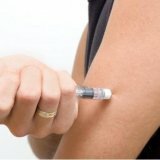Autoimmune thyroiditis: treatment
 In the treatment of autoimmune thyroiditis, modern treatment is now being used. The development of medicine in the field of research of this disease evolved under the influence of a number of circumstances.
In the treatment of autoimmune thyroiditis, modern treatment is now being used. The development of medicine in the field of research of this disease evolved under the influence of a number of circumstances.
First, the causes of this disease were clarified, and its timely diagnosis was improved. Secondly, clinical experience was accumulated, which allowed to evaluate the results of conservative and operative methods of treatment.
Since the very first description of this disease and approximately until the late 50's. Clinicians adhered to when identifying surgical treatment tactics. Autoimmune thyroiditis was treated by the method of subtotal resection of the thyroid gland. But severe hypothyroidism, which develops after such operations, caused doctors in many cases to refuse surgical intervention in favor of other methods.
Treatment of thyroiditis.
At the moment, a disease like thyroiditis autoimmune is treated with conservative methods. It is very important that treatment be started on time in case you are diagnosed with autoimmune thyroiditis. Treatment is prescribed by a doctor. In the treatment of thyrotoxic hormones( this is thyroxine, triiodothyronine).They are prescribed for substitution purposes( hypothyroidism), as well as to prevent hyperplasia of the thyroid( in euthyroidism), as well as to suppress the immune process. In this case, the treatment starts with the smallest doses, taking into account the age of the patient and the functional state of the gland.
The main condition for hormone therapy in autoimmune thyroiditis is continuity and duration of treatment. The clinical effect is usually detected after 3 to 5 months. Treatment is carried out constantly, because even a short-term cessation of medication will inevitably lead to a relapse.
The main objective criterion for the effectiveness of thyroid drugs is the level of TSH in the patient's blood.
Until the issue of how to use hormones in patients without clinical signs of hypothyroidism, or in the presence of extremely biochemical signs of hypothyroidism of the thyroid gland, has not been resolved. Disputes are also about how long in such cases it is necessary to use thyroid hormones. The maximum suppression of the thyrotropic function of the pituitary gland is not fully justified, since it can lead to a decrease in the compensatory possibilities of the organism.
In some cases, thyroid hormones do not give a clinical effect when applied. There is also an individual intolerance to this group of drugs. In such cases, there is a need for the use of glucocorticoids. The attitude towards their use in autoimmune thyroiditis is contradictory. On the one hand, steroids give a very pronounced therapeutic effect, and on the other - there is a need for long-term use of drugs and, consequently, the danger of various complications due to this( weight gain, withdrawal syndrome, steroid diabetes).
Side effects of glucocorticoids can be significantly reduced by changing the mode of administration of drugs. Their reception is conducted taking into account the daily rhythm of hormone secretion of cortisol. Therefore, a patient should receive 2/3 of the daily dose at seven in the morning and one-third at 11 am. If the use of prednisolone is contraindicated( with peptic ulcer disease, diabetes), then in these cases it is recommended to use decaris( levamisole) in a dose of 150 mg for one intake once a week for two months.
New treatment technique.
A new technique has recently appeared, implying an intraglanded introduction of prolonged-acting steroid hormones prescribed by the attending physician to patients with autoimmune thyroiditis. The drug( kenalog, metipred) is injected into each portion of the thyroid gland one at a time. The interval between injections should be 6-10 days. The full course of treatment contains 4-10 injections and is performed 1-2 times during the year. The clinical experience of this kind of steroid use in autoimmune thyroiditis disease is still small, but the results are quite encouraging. The advantage of this method is that it becomes possible to perform treatment on an outpatient basis. It is very important that the total dose of this drug for the entire course of treatment is small, which minimizes the possible complications associated with the treatment of steroid hormones.
For the treatment of autoimmune thyroiditis, e-aminocaproic acid is also recommended. The authors conducted acid treatment in 200 patients and received a pronounced clinical effect even in cases when all other drugs were ineffective. That's why they think that the drug aminocaproic acid is indicated to patients who suffer from intolerance to thyroid hormones. The drug can be used both as a single treatment and in combination with other therapeutic agents.
Aminocaproic acid is considered as a pathogenetic therapy in a disease such as thyroiditis. Treatment with the drug has a positive effect on cellular immunity. This is expressed in the normalization of the patient's lymphocytogram.
In 80% of patients with autoimmune thyroiditis, taking aminocaproic acid is accompanied by a decrease in the titer of antithyroid antibodies, in 20% of patients, antibodies were not detected.
Even more effective in the treatment of a combination of aminocaproic acid and levamisole. The clinical effect occurs approximately 3 months after the start of treatment.
Finally, there is also information about the successful use of the Russian immunomodulator T-activatedin in the treatment of autoimmune thyroiditis. The conducted studies of the drug showed that T-activin leads to an improvement in the T-system of immunity.
As already noted, conservative treatment of the disease is a very long process, and it requires perseverance and patience from both the doctor and the patient. Treatment is conducted for at least one year.



